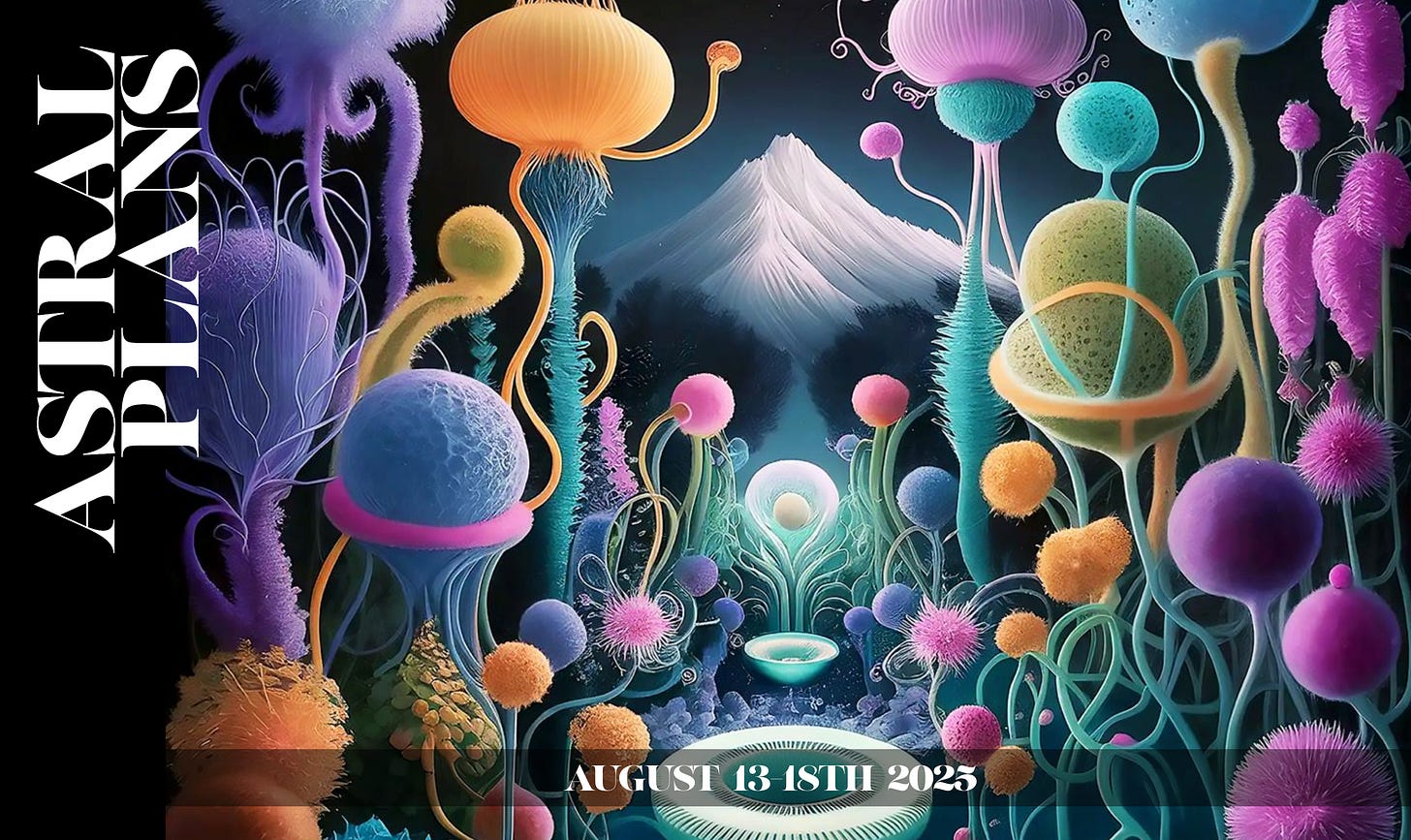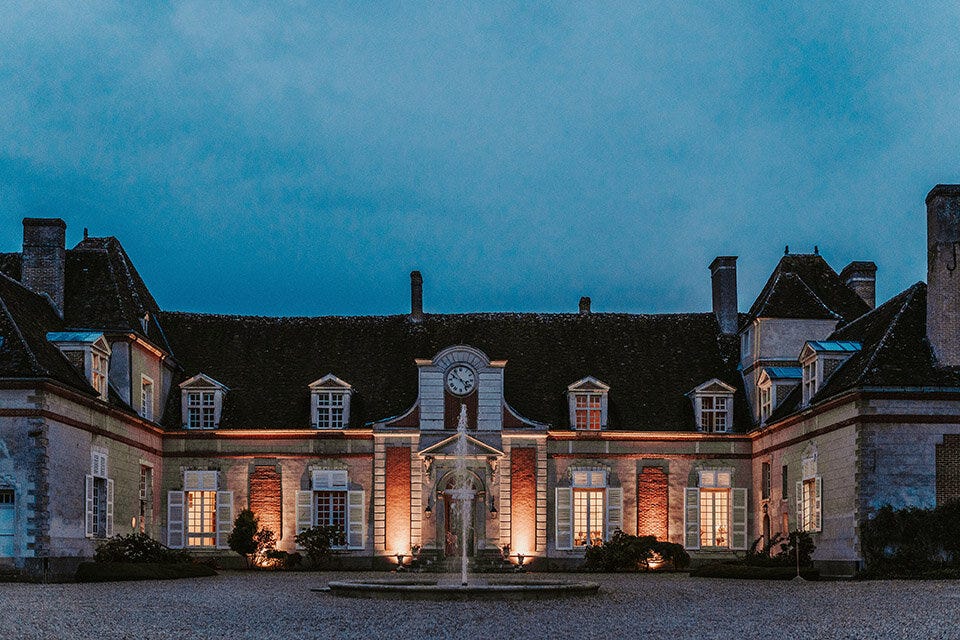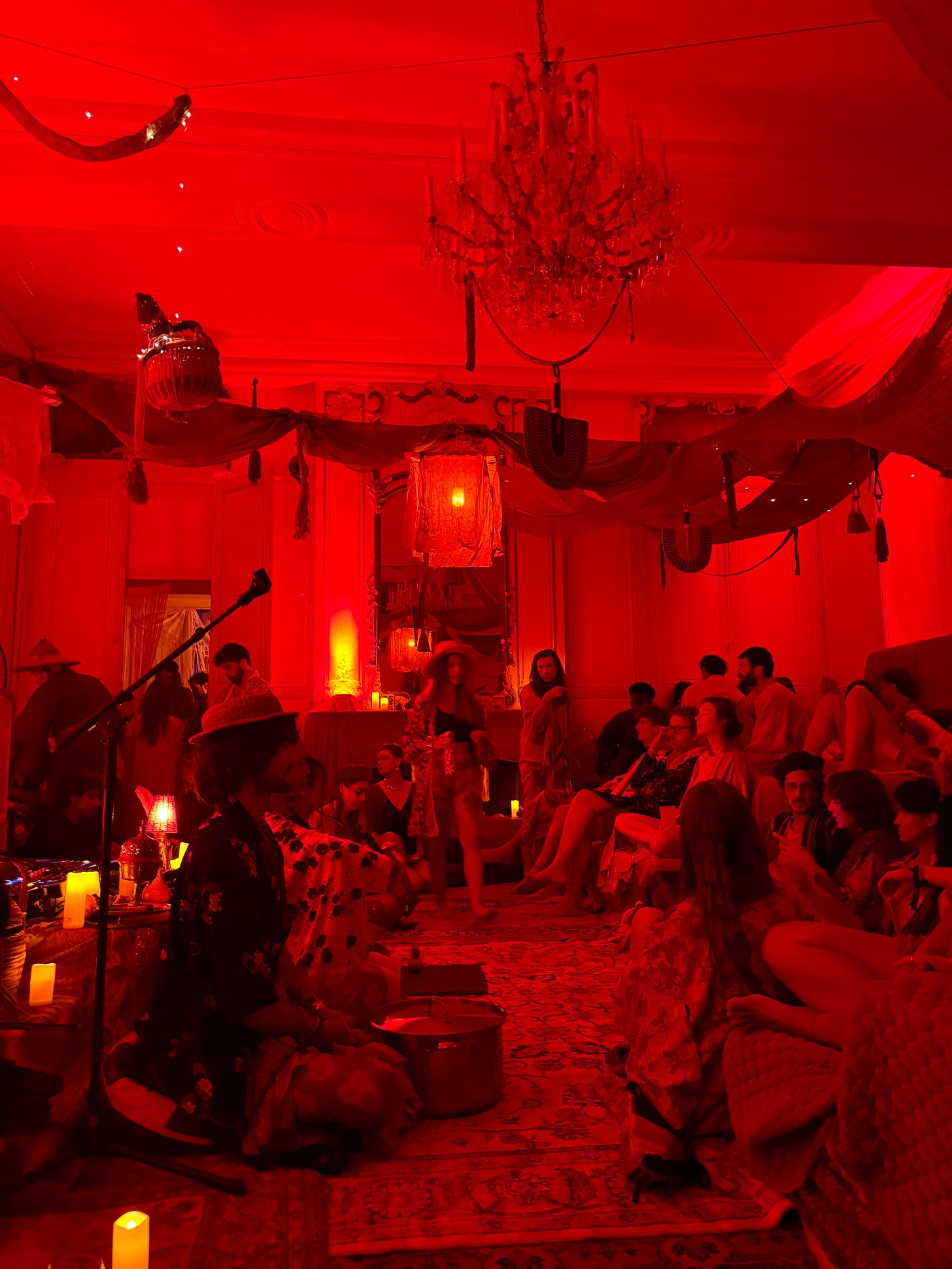Greetings from Paris
I’m writing from a street-side cafe in Paris’ Quartier Pigalle, my heart still swelling from an incredible weekend performing at the debut Astral Plans festival at Chateau du Fey, an hour south-east of Paris.
Astral Plans is described as “a forward‑thinking, multi‑dimensional festival designed to inspire knowledge‑sharing and holistic personal growth.” Read more here. But what made it truly unique was the caliber of artists and the intimate settings that encouraged genuine vulnerability.
I was invited to tell a story in one of their spaces called “The Opium Den,” a cozy room in the 17th-century chateau, transformed with silk drapes, brass lamps, and scattered cushions to evoke 1850s Hong Kong. The lineup of performers included mentalists and butoh dancers from Hong Kong, spoken word poets from France, musicians from Kurdistan and Iran, and storytellers like myself.
I responded to the theme by writing and performing a fictional story from the perspective of a photographer who falls in love with a Hong Kong woman through his camera lens — only to turn to the city's opium dens to soothe his broken heart.
The story emerged from real heartbreak transformed into fiction, my attempt at reimagining Confessions of an English Opium Eater for the modern era.
What made the performance particularly magical was the serendipitous collaboration with Stav, a talented pianist who improvised atmospheric music as I spoke. I'd always wanted to read my writing over piano ever since hearing Kerouac do the same in his 1959 appearance on the Steve Allen show — this felt like a dream realized.
Below is the full text of my story, plus a video of the first half of my storytelling (it got cut off for some reason). I should be getting a clean audio track eventually, but for now I wanted to share this snippet of my most recent work for my subscribers.
Paid subscribers can access an additional section at the bottom which explains more about what’s true / false in this story.
Enjoy!
Marko
VIDEO RECORDING OF MY PERFORMANCE
FULL TEXT
I
They say you don’t chose the poppy. It chooses you. I used to laugh at such mystical nonsense.
That was before Hong Kong. Before her. Before my first pipe. Before I learned that some heartbreaks... require specialized medicine.
The den was hidden behind a tea shop, down a stairway that seemed to descend through centuries of time.
The owner, an ancient woman with eyes like black pearls, took one look at me and said:
"Broken heart?"
"How do you know?"
"Love and opium are sisters. Both beautiful. Both devastating. Both absolutely necessary. Both blind you completely… then make you see clearly. But don't worry. First, opium will help you forget. Then, it will help you remember."
This is that remembering.
II
I came to Hong Kong on assignment. A photo essay for National Geographic about disappearing traditions.
I was documenting the city's contradictions – fishing villages swallowed by development, street markets next to luxury boutiques. East and West in constant collision and conversation.
Photography is the art of chasing the setting sun, the way it bounces from the skyscrapers to the temples and turns the bay into liquid gold. Capturing fleeting moments from the passage of time.
Sometimes you immortalize what was never meant to last. Other times, you have rolls upon rolls of memories that will never be developed.
That's how I found her. Through my lens, in the window of her family's traditional medicine shop. She was grinding herbs with a mortar and pestle, her movements precise, meditative.
Three days I returned... pretending to photograph the neighborhood... really capturing her. The way she tied her hair... smiled at elderly customers like beloved relatives... how she moved around the shop in her black silk qipao like water.
On the fourth day, I walked up and introduced myself. Told her about my assignment, asked her to show me around. She said her name was Mei Ling.
III
She became my guide through the Hong Kong most tourists never see. Hidden rooftop gardens tended by grandmothers who'd fled the mainland decades ago. Night markets where vendors still measured tea in ancient brass scales. Temples tucked between skyscrapers where incense and prayers rose together.
And I photographed everything, but mostly I photographed her. The way she moved through her world like poetry in motion. How she spoke to street cats in Cantonese. The reverence in her face when she showed me her grandmother's calligraphy.
We made love for the first time during a typhoon, in her apartment forty floors above the chaos. Floor-to-ceiling windows, lightning illuminating her body like the flash of my camera. Memories clearer today than any photo I ever snapped.
For six months, we lived in that beautiful space between worlds, each drawn to the foreign in the other. Me to her roots. Her to my cosmopolitan lifestyle. I thought love could exist in that liminal space forever.
I thought love would be enough...
IV
Then one day, my editor approved my Hong Kong series. National Geographic chose it for the cover, sent me my biggest paycheck yet and told me they wanted to make it a series about disappearing cultures around the world. I rushed to her shop, breathless with possibility.
"Come with me," I said. "We can go anywhere. Document more places with endangered traditions, tell stories that matter."
Her face changed. Not cold, but... careful.
"I have been speaking with my parents about us. They don't approve."
"Because I'm a foreigner?"
"And… you're an artist. They want me to marry someone with a more respectable career. Someone who lives here.”
“I can live anywhere.”
“Their friends have a son. A doctor who works with our herb business. They have been having conversations...
“What kind of conversations?”
“The kind that end in wedding announcements."
I was shocked. Told her it was the 21st century. She didn't have to marry who her family wanted. She could come with me. We could live anywhere. But she wouldn't listen.
"Love alone isn't enough. You're asking me to choose between my heart and my duty. In your culture, that's romantic. In mine, it's selfish."
The worst part was that I could see her point. We were attracted to each other because of our differences. I'd just never imagined they would be what drove us apart.
V
I left her apartment, moved into a cheap room in the Chungking Mansions and hung around Hong Kong for two more months. I told myself I was busy planning out my next trips. Really, I was hoping she'd change her mind.
The day I saw her with her new boyfriend was the day I walked into the opium den.
In my poppy dreams, I could visit versions of our story where different choices were possible. Where she chose me over duty. Where I chose to stay and become part of her world. Where love was simple instead of complicated by obligation.
The opium showed me how I’d confused love with art. I'd fallen in love with her partly because she embodied the Hong Kong I wanted to capture – exotic enough to be fascinating, modern enough to be accessible.
Then, the soft embrace of opium's mercy showed me the truth she'd tried to tell me.
Love alone is not enough. Love needs context, compatibility, shared vision of the future.
I'd offered her beautiful chaos. She chose meaningful stablity.
And maybe... maybe that was the more mature choice.
VI
I left Hong Kong eventually. Took assignments in Kabul, then Beirut, then Tangier – cities where locals were fighting to keep disappearing traditions alive. Traditions like their opium dens.
In each city, I found my den. Different rituals, same purpose. The poppy teaches you to forget the sharp edges of heartbreak, then slowly, gently, teaches you to remember without bleeding.
Photography taught me that some images develop perfectly – sharp, clear, exactly what you intended. Others come out blurred, overexposed, beautiful accidents. And some... some are too precious to develop at all. They live forever in the darkroom of possibility.
VII
I still think about her. I still have the photographs – not just my prints. But rolls upon rolls of film I've never developed. Images too painful to expose to light.
But when I really want to remember her, I don't go to my darkroom. I go to the den.
I light the pipe and let the poppy dreams carry me back to that shop window in Hong Kong, to her face in afternoon light, to the six months together in our small space between worlds.
And suddenly... I'm in the warm space between forgetting and remembering where I no longer cry because it's over. I smile because it happened.
Paid Subscriber Bonus — Truth Behind Fiction
When I performed this story, most of the audience assumed it was autobiographical. That's because while the narrative was fictional, the emotional truth was entirely real — drawn from three different heartbreaks and transformed into a single, cohesive story.
Here's how real life became fiction, and what I learned about storytelling in the process.
Keep reading with a 7-day free trial
Subscribe to The Missive to keep reading this post and get 7 days of free access to the full post archives.




